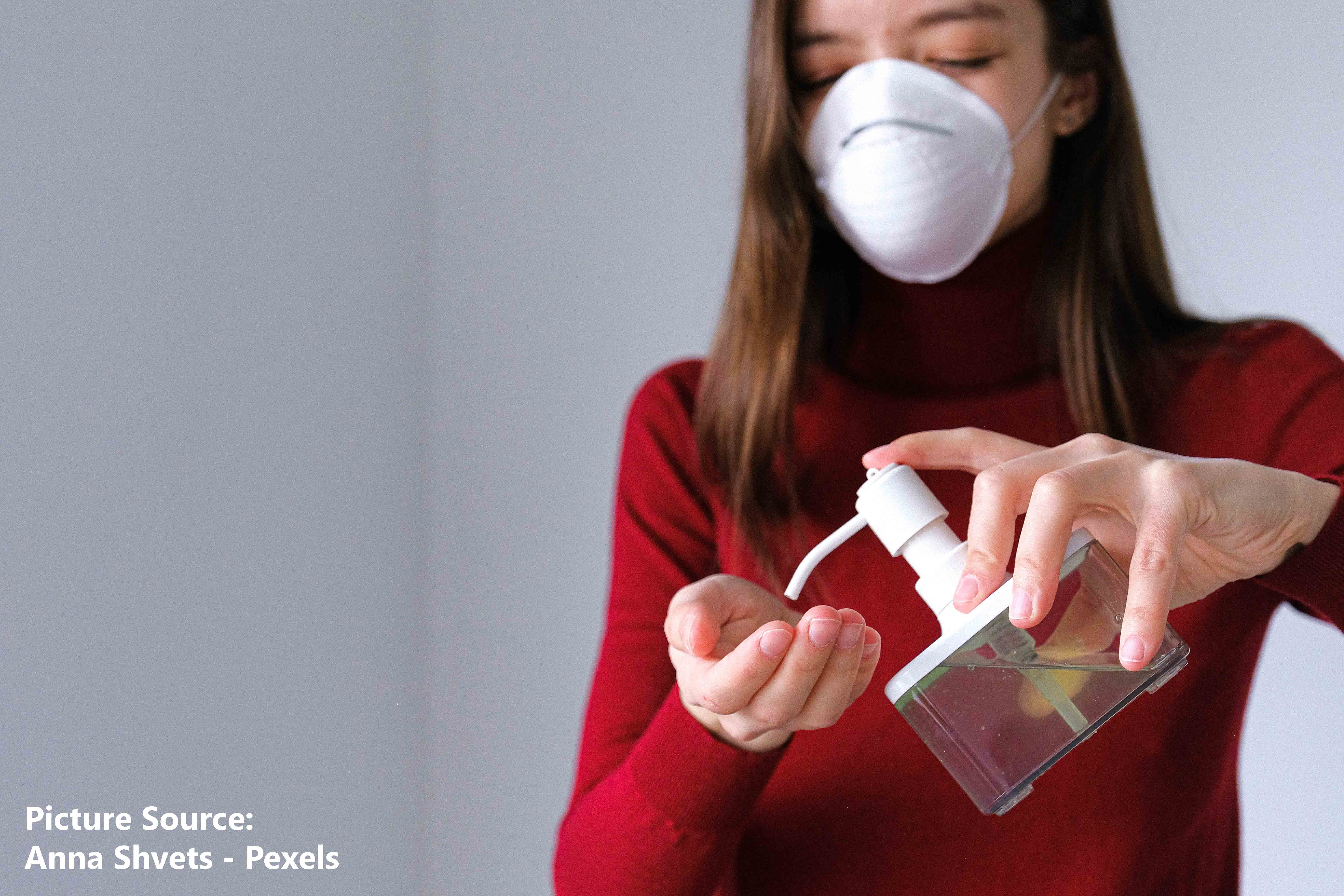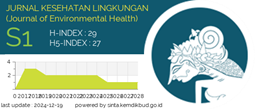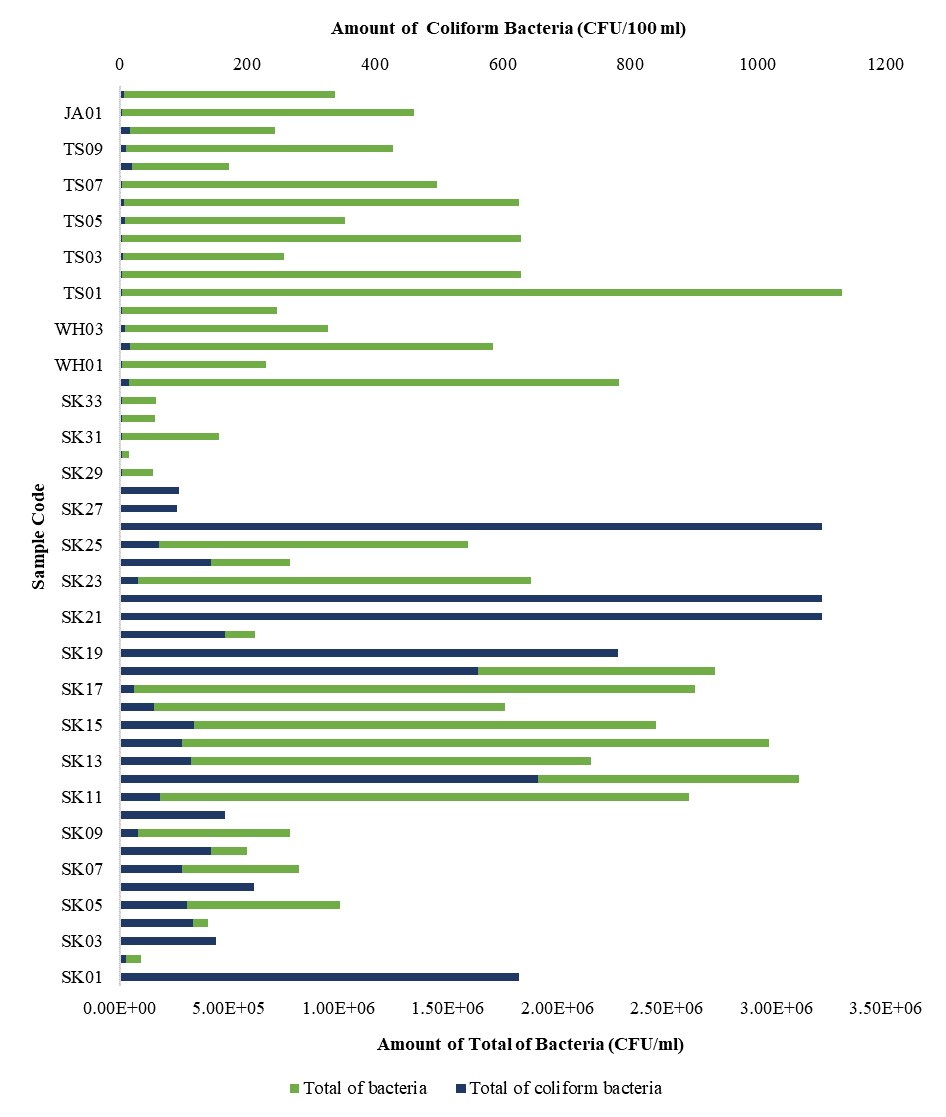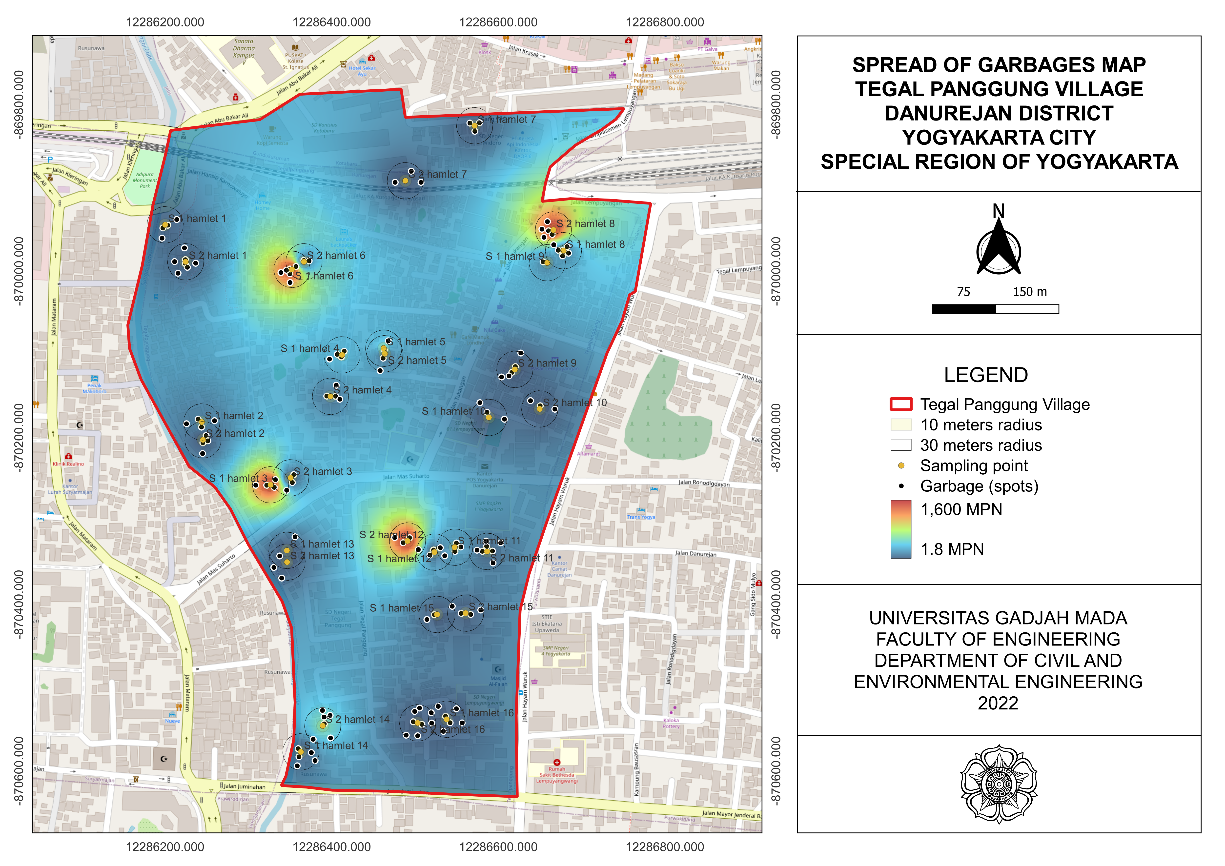DETERMINANT FACTORS ON PERSONAL HYGIENE IN THE PREVENTION OF COVID19 IN THE COMMUNITY OF BENGKALIS REGENCY, RIAU, IN 2021

Introduction: The prevalence of personal hygiene behavior in the Riau community in 2018 remains below 39.9%. Therefore, this study aims to identify the determinants of personal hygiene in preventing Covid19 among the residents of Bengkalis Regency, Riau. Methods: Data was collected online in March 2021 from 214 respondents regarding their age, gender, educational history, personal hygiene, infrastructure, accessibility, information exposure, family support, social support, and level of knowledge. The descriptive quantitative study was used with a cross-sectional design and the Chi-square test. Results and Discussion: The results showed that from 214 respondents, those with good and poor personal hygiene are 139 (65%) and 75 (35%) individuals, respectively. The factors that have a statistical relationship with personal hygiene (p<0.05) are age, gender, infrastructure, accessibility, information exposure, family support, and social support, with p-values of 0.000, 0.005, 0.000, 0.000, 0.000, 0.000, and 0.000, respectively. Meanwhile, variables of knowledge and educational history with p values of 0.664 and 0.810, respectively, were not statistically related. Conclusion: Efforts to promote personal hygiene for the prevention of the pandemic include health worker education on Covid19 information, especially the risk factors and how to correctly use masks.
Worldomaters. Covid Live Update: 181,861,268 Cases and 3,938,817 Deaths from the Coronavirus. United States: Worldometer; 2021. https://www.worldometers.info/coronavirus/
Riau Provincial Government. Riau Tanggap Virus Corona. Pekanbaru; Riau Provincial Government; 2021. https://corona.riau.go.id/
World Health Organization. Transmisi Sars-Cov-2: Implikasi terhadap Kewaspadaan Pencegahan Infeksi. Geneva: World Health Organization; 2020 https://www.who.int/docs/default-source/searo/indonesia/covid19/transmisi-sars-cov-2---implikasi-untuk-terhadap-kewaspadaan-pencegahan-infeksi---pernyataan-keilmuan.pdf?sfvrsn=1534d7df_4
United Nations International Children's Emergency Fund. Covid19 dan Penyebarannya di Indonesia. 2020;4. https://www.unicef.org/indonesia/media/4661/file/panduan%20praktis%20untuk%20pelaku%20bisnis%20dalam%20mendukung%20wash.pdf
Kampf G, Todt D, Pfaender S, Steinmann E. Persistence of Coronaviruses on Inanimate Surfaces and Their Inactivation with Biocidal Agents. Journal of Hospital Infection. 2020;104(3):246–251. https://doi.org/10.1016/j.jhin.2020.01.022
Ghinai I, Mcpherson TD, Hunter JC, Kirking Hl, Christiansen D, Joshi K, et al. First Known Person-to-person Transmission of Severe Acute Respiratory Syndrome Coronavirus 2 (Sars-Cov-2) in the USA. Lancet. 2020;395(10230):1137–1144. https://doi.org/10.1016%2FS0140-6736(20)30607-3
Chen N, Zhou M, Dong X, Qu J, Gong F, Han Y, et al. Epidemiological and Clinical Characteristics of 99 Cases of 2019 Novel Coronavirus Pneumonia in Wuhan, China: A Descriptive Study. Lancet. 2020;395(10223):507–513. https://doi.org/10.1016/s0140-6736(20)30211-7
Adhikari SP, Meng S, Wu YJ, Mao YP, Ye RX, Wang QZ, et al. Epidemiology, Causes, Clinical Manifestation and Diagnosis, Prevention and Control of Coronavirus Disease (Covid19) During the Early Outbreak Period: A Scoping Review. Infectious Diseases of Poverty. 2020;9(29):1-12. https://doi.org/10.1186/s40249-020-00646-x
Ministry of Health of Republic Indonesia. Main Results of Riskesdas 2018. Jakarta: Ministry of Health Republic of Indonesia; 2018. http://repository.litbang.kemkes.go.id/3514/
Central Bureau of Statistics. Community Behavior During the Covid19 Pandemic 2020 Jakarta: Central Bureau of Statistics; 2021. https://www.bps.go.id/publication/download.html
Central Bureau of Statistics. Result of an Online Survey of the Socio-Economic Condition of the Riau People when Adapting to New Habits 2020. Jakarta: Central Bureau of Statistics; 2021. https://riau.bps.go.id/publication/download.html
Ministry of Health of Republic Indonesia. Riau Province Riskesdas 2018 Report. Jakarta: Publisher of the Health Research and Development Agency; 2019. https://ejournal2.litbang.kemkes.go.id/index.php/lpb/issue/view/227
Altaher AM, Elottol AEY, Jebril MA, Aliwaini SH. Assessment of Awareness and Hygiene Practices Regarding Covid19 Among Adults in Gaza, Palestine. New Microbes and New Infections. 2021;41(100876):1-10. https://doi.org/10.1016%2Fj.nmni.2021.100876
World Health Organization. Basic Protective Measures Against the New Coronavirus. Geneva: World Health Organization; 2020. https://www.who.int/emergencies/diseases/novel-coronavirus-2019/advice-for-public
Mieth L, Mayer MM, Hoffmann A, Buchner A, Bell R. Do They Really Wash Their Hands? Prevalence Estimates for Personal Hygiene Behaviour During the Covid19 Pandemic Based on Indirect Questions. BMC Public Health. 2021;21(12):1-8. https://doi.org/10.1186/s12889-020-10109-5
Przekwas A, Chen Z. Washing Hands and the Face May Reduce Covid19 Infection. Medical Hypotheses. 2020;144(110261):1-3. https://doi.org/10.1016%2Fj.mehy.2020.110261
Purnama SG, Susanna D. Hygiene and Sanitation Challenge for Covid19 Prevention in Indonesia. Kesmas. 2020;1(Special Issue):7-13. http://dx.doi.org/10.21109/kesmas.v15i2.3932
World Health Organization. Recommendations to Member States to Improve Hand Hygiene Practices to Help Prevent the Transmission of the Covid19 Virus. Geneva: World Health Organization; 2020. https://www.who.int/publications-detail-redirect/recommendations-to-member-states-to-improve-hand-hygiene-practices-to-help-prevent-the-transmission-of-the-covid19-virus
Alshammari F. Knowledge and Perception of Health Practitioners Towards Mers-Cov in Hail Region, Kingdom of Saudi Arabia. American Journal of Nursing Research. 2018;6(1):12–17. http://www.sciepub.com/ajnr/abstract/8608
Wulandari A, Rahman F, Pujianti N, Sari AR, Laily N, Anggraini L, et al. Hubungan Karakteristik Individu dengan Pengetahuan tentang Pencegahan Coronavirus Disease 2019 pada Masyarakat di Kalimantan Selatan. Jurnal Kesehatan Masyarakat Indonesia. 2020;15(1):42–46. https://doi.org/10.26714/jkmi.15.1.2020.42-46
Esthevyani N, Darundiati YH, Wahyuningsih NE. Determinan Praktik Personal Hygiene Mahasiswa Universitas Diponegoro sebagai Bentuk Pencegahan dalam Situasi Pandemi Covid19. Link. 2021;17(1):51–60. https://doi.org/10.31983/link.v17i1.6796
Acheampong DO, Barffour IK, Boye A, Aninagyei E, Ocansey S, Morna MT. Male Predisposition to Severe Covid19: Review of Evidence and Potential Therapeutic Prospects. Biomed Pharmacother. 2020;131(110748):1-12. https://doi.org/10.1016/j.biopha.2020.110748
Pollán M, Pérez-Gómez B, Pastor-Barriuso R, Oteo J, Hernán Ma, Pérez-Olmeda M, et al. Prevalence of Sars-Cov-2 in Spain (Ene-Covid): A Nationwide, Population-Based Seroepidemiological Study. The Lancet. 2020;396(10250):535–544. https://doi.org/10.1016/s0140-6736(20)31483-5
Choi JS, Kim JS. Factors Influencing Preventive Behavior Against Middle East Respiratory Syndrome-Coronavirus Among Nursing Students in South Korea. Nurse Educ Today. 2016;40(1):168–172. https://doi.org/10.1016/j.nedt.2016.03.006
Hasman R. Implementasi Kebijakan Alokasi Dana Desa di Kecamatan Kinovaro Kabupaten Sigi. Katalogis. 2015;3(11):107-117. http://jurnal.untad.ac.id/jurnal/index.php/Katalogis/article/view/6463
Minister of Home Affairs. The State Minister's Decision is 440-830 Years 2020 about Productive Normal Order Guide and Safe Corona Virus 2019 Disease Virus for Civil Personnel in the Environment of the Interior Ministry and Local Government. Jakarta: Transport Minister; 2020. https://dishub.kukarkab.go.id/pages/keputusan-menteri-dalam-negeri-nomor-440-830-tahun-2020-tentang-pedoman-tatanan-normal-baru-produktif-dan-aman-corona-virus-disease-2019-bagi-aparatur-sipil-negara-di-lingkungan-kementerian-dalam-negeri-dan-pemerintah-daerah
Dewi FC, Prabamurti PN. Faktor-Faktor yang Berhubungan dengan Perilaku Pekerja dalam Penggunaan APD di Sentra Pengasapan Ikan Kelurahan Bandarharjo Kota Semarang. Jurnal Kesehatan Masyarakat UNDIP. 2017;5(5):1000–1009. https://doi.org/10.14710/jkm.v5i5.19228
Carico Jr R, Sheppard J, Thomas CB. Community Pharmacists and Communication in the Time of Covid19: Applying the Health Belief Model. Research in Social and Administrative Pharmacy. 2021;17(1):1984–1987. https://doi.org/10.1016/j.sapharm.2020.03.017
Maharani R, Andriyani W. Faktor yang Berhubungan dengan Perilaku Personal Hygiene saat Menstruasi pada Santriwati di MTS Pondok Pesantren Dar El Hikmah Kota Pekanbaru. Jurnal Kesmas. 2018;1(1):69-77. https://dx.doi.org/10.31539/kesmars.v1i1.172
Truong NX, Ngoc BH, Ha NT. The Impacts of Media Exposure on Covid19 Preventive Behaviors Among Vietnamese People: Evidence using Expanded Protection Motivation Theory. Sage Open. 2022;12(2):1-13. https://doi.org/10.1177/21582440221096129
Bedford J, Enria D, Giesecke J, Heymann Dl, Ihekweazu C, Kobinger G, et al. Covid19: Towards Controlling of a Pandemic. The Lancet. 2020;395(10229):1015–1018. https://doi.org/10.1016/s0140-6736(20)30673-5
Melki J, Tamim H, Hadid D, Farhat S, Makki M, Ghandour L, et al. Media Exposure and Health Behavior During Pandemics: The Mediating Effect of Perceived Knowledge and Fear on Compliance with Covid19 Prevention Measures. Health Community. 2022;37(5):586–596. https://doi.org/10.1080/10410236.2020.1858564
Safitri F, Marjulita A, Andika F. Hubungan Pengetahuan, Dukungan Keluarga dan Kondisi Fisik dengan Personal Hygiene pada Lansia di UPTD Rumoh Sejahtera Geunaseh Sayang Ulee Kareng Kota Banda Aceh. Journal of Healthcare Technology and Medicine. 2019;2(2):162–170. https://jurnal.uui.ac.id/index.php/JHTM/article/view/249/64
Ndore S, Sulasmini S, Hariyanto T. Dukungan Keluarga Berhubungan dengan Kepuasan Interaksi Sosial pada Lansia. Care Jurnal Ilmiah Ilmu Kesehatan. 2017;5(2):256–262. https://doi.org/10.33366/cr.v5i2.554
Laili AFN. Hubungan Dukungan Keluarga dan Pengetahuan terhadap Perawatan Diri Penderita Kusta di Puskesmas Grati Tahun 2016. Indonesia Journal Public Health. 2017;12(1):13–26. https://doi.org/10.20473/ijph.v12i1.2017.13-26
Adibah L, Nugroho D, Winarni S. Hubungan Beberapa Faktor dengan Praktik Hygiene Genitalia Eksternal pada Remaja Putri Pondok Pesantren Al-Ishlah Tembalang Semarang tahun 2016. Jurnal Kesehatan Masyarakat UNDIP. 2016;4(3):1–9. https://doi.org/10.14710/jkm.v4i3.12785
Dzakiyya NM, Fatah MZ. Faktor Dukungan Sosial Perilaku Personal Hygiene Genitalia Napi Perempuan di Lapas Kelas IIa Sidoarjo. Jurnal Keperawatan Muhammadiyah. 2019;4(1):68-73. http://dx.doi.org/10.30651/jkm.v4i1.2054
Ye Y, Wang R, Feng D, Wu R, Li Z, Long C, et al. The Recommended and Excessive Preventive Behaviors During the Covid19 Pandemic: A Community-Based Online Survey in China. International Journal of Environmental Research Public Health. 2020;17(19):6953. https://doi.org/10.3390/ijerph17196953
Purnamasari I, Raharyani AE. Tingkat Pengetahuan dan Perilaku Masyarakat Kabupaten Wonosobo tentang Covid -19. Jurnal Ilmu Kesehatan. 2020;10(1):33–42. https://Ojs.Unsiq.Ac.Id/Index.Php/Jik/Article/View/1311
Notoatmodjo S. Pendidikan dan Perilaku Kesehatan. Jakarta: Rineka Cipta; 2019.
Green L, Kreuter M. Health Promotion Planning: An Educational and Environmental. California: Mayfield Publishing; 1991.
Sembiring EE, Meo MLN. Pengetahuan dan Sikap Berhubungan dengan Resiko Tertular Covid19 pada Masyarakat Sulawesi Utara. Ners Jurnal Keperawatan. 2020;16(2):75–82. https://doi.org/10.25077/njk.16.2.75-82.2020
Barakat AM, Kasemy ZA. Preventive Health Behaviours During Coronavirus Disease 2019 Pandemic Based on Health Belief Model Among Egyptians. Middle East Current Psychiatry. 2020;27(43):1-9. https://doi.org/10.1186/s43045-020-00051-y
Copyright (c) 2022 JURNAL KESEHATAN LINGKUNGAN

This work is licensed under a Creative Commons Attribution-NonCommercial-ShareAlike 4.0 International License.
1. Copyright of all journal manuscripts is held by the Jurnal Kesehatan Lingkungan.2. Formal legal provisions to access digital articles of electronic journal are subject to the provision of the Creative Commons Attribution-ShareAlike license (CC BY-NC-SA), which means that Jurnal Kesehatan Lingkungan is rightful to keep, transfer media/format, manage in the form of databases, maintain, and publish articles.
3. Published manuscripts both printed and electronic are open access for educational, research, and library purposes. Additionally, the editorial board is not responsible for any violations of copyright law.
JKESLING by UNAIR is licensed under a Creative Commons Attribution-ShareAlike 4.0 International License.







































